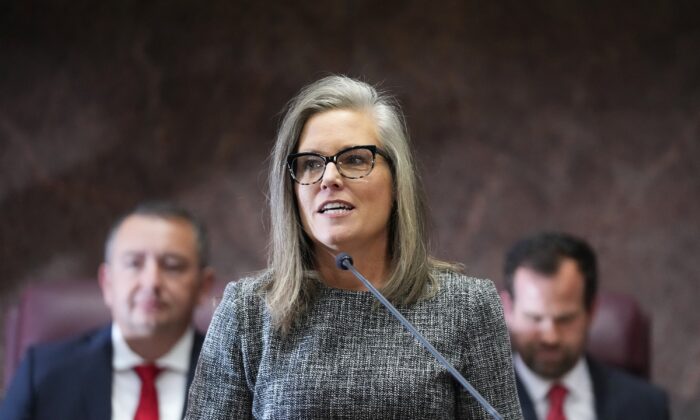At issue are executive orders to use state buildings as voting locations and state agencies to improve voter registration.
The Arizona Supreme Court on Thursday dismissed a Republican challenge to multiple executive orders signed by Gov. Katie Hobbs that her office said would make voting and registration easier.
The Republican Party of Arizona and its chair, Gina Swoboda, petitioned the state Supreme Court in August to take up the matter without first going through a county court. In a decision issued by the state’s highest court, Chief Justice Ann Scott Timmer wrote that the GOP had offered no arguments for why the court should take the matter up.
“The issues raised in the special action petition will not be mooted by the November 2024 election,” Timmer wrote, adding that the Republican Party did not provide a reason why it did not challenge the executive orders until August, or three months before the General Election.
“We further note that Petitioners have not addressed why neither [of the executive orders were] challenged until this point in time. An earlier challenge would have permitted the Petitioners to secure a final ruling well before the upcoming election.”
The court did not express any view on the merits of the GOP’s arguments against the executive orders.
In November 2023, Hobbs, a Democrat, signed several executive orders that included the use of state buildings as voting locations and mandated that state agencies provide voting registration information and assistance to voters in Arizona.
In a lawsuit, the GOP and Swoboda argued against the order to use state buildings as polling locations, raising alarms that facilities that belong to the Department of Corrections and the Department of Juvenile Corrections could be used to house ballots and voting equipment.
The executive order is “silent about important issues regarding completed ballots and voting procedures including, for example, where to store completed ballots until they can be sent to the appropriate election officials or keeping a chain-of-custody log for those completed ballots,” their lawsuit states.
It also sought to block Hobbs’s office from enforcing the executive orders on “the grounds they exceed the powers granted her by the Arizona Constitution and Arizona statutes” and violate the Constitution’s separation of powers clause that allows the Legislature to enact election laws.
The GOP suit argued that due to the proximity of the November election, the issue “needs to be decided and her conduct stopped immediately” and that a direct file to the Arizona Supreme Court is warranted. The court was then asked to prevent state agencies from moving forward with implementing the governor’s orders.
But the Arizona governor’s office, in a response to the lawsuit, argued that the state Supreme Court lacks the jurisdiction to issue a ruling on the matter. The executive orders were also only challenged 10 months after they were signed into law, her lawyers said.
“Petitioners did nothing until the day before the ballot printing deadline for the general election … and 49 days before early voting begins,” the filing said. “They then ran straight to this Court seeking relief based on a supposed emergency, ignoring that their own failure to act at any earlier point created the alleged need for ‘immediate’ action.”
There was no immediate response from the state’s Republican Party or Swoboda after the decision. It’s not clear whether they will appeal or re-file the case in another court.
The Epoch Times contacted the Arizona GOP for comment on Friday but received no response by publication time.
A database maintained by the National Conference of State Legislatures shows that Arizona officials will start sending out absentee and mail-in ballots between 24 and 27 days before the Nov. 4 election, or between Oct. 8 and Oct. 11. Arizona’s in-person voting is scheduled to start on Oct. 8.

